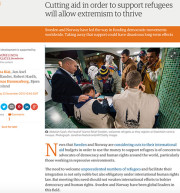
UN Special Rapporteur Maina Kiai has co-authored a commentary for the Guardian's Global Development blog urging the governments of Sweden and Norway not to cut international development aid to support the recent influx of refugees. The piece was co-authored by former Council of Europe Commissioner for Human Rights Thomas Hammarberg, former Swedish ambassador for human rights Jan Axel Nordlander, Civil Rights Defenders executive director Robert Hardh; and Norwegian Helsinki Committee secretary general Bjørn Engesland. Sweden is currently studying the potential effects of cutting its aid budget by up to 60%, while Norway is reportedly looking at a roll-back of approximately 21%. The authors note that both countries are among the most generous in the world in terms of foreign aid - particularly when it comes to giving directly to civil society. Sweden, for example, dedicates roughly one-sixth of its aid budget to civil society, including support for those working on democracy-building and human rights. Reducing this support would decimate civil society at a time when such support is most needed. "The consequences of a weakened global civil society movement could ultimately come back to haunt Sweden and Norway," the authors write. "Funding independent civil society in other countries is not just... Continue reading →

STOCKHOLM – The Community of Democracies has launched a new two-year project in conjunction with the UN Special Rapporteur on the rights to freedom of peaceful association and of assembly aimed at enhancing space for civil society, focusing on the right to access financial resources. The project, “Protecting Civic Space and the Right to Access Resources”, was officially launched in Stockholm, Sweden, on Feb. 24, 2014. The project is funded by the Swedish Ministry of Foreign Affairs. The centerpiece of the project is a series of regional dialogues led by UN Special Rapporteur Maina Kiai and members of his team, to be conducted with the participation of local and regional civil society groups. Separate consultations will also take place with the governments of or more countries in each region. Regional dialogues will take place in Eastern Europe, Asia, Africa, the MENA region and Latin America throughout 2014-15. The first dialogue is tentatively scheduled for later this year. “Across the world, governments are moving rapidly to squeeze civil society out of its rightful place in the public sphere,” Kiai said. “Many of them see civil society as a competitor, challenging their authority. And they are attacking from all angles, including trying to cut off their ability to seek, receive and... Continue reading →